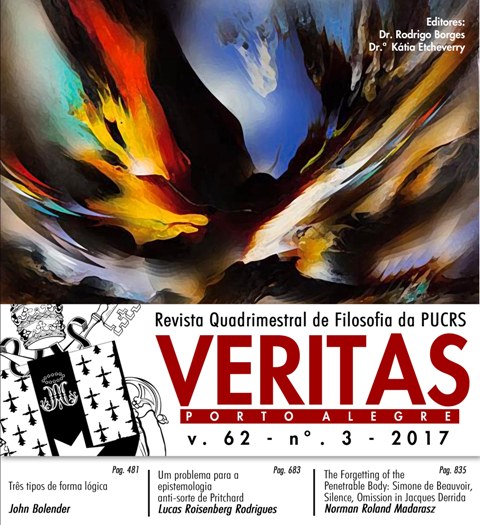Disjuntivismo epistemológico e ceticismo radical
DOI:
https://doi.org/10.15448/1984-6746.2017.3.27532Palavras-chave:
disjuntivismo epistemológico, ceticismo radical, internalismo, externalismo.Resumo
O disjuntivismo epistemológico é uma teoria filosófica que tem recebido uma atenção especial nos últimos anos. Particularmente porque ela tem sido encarada por muitos como uma via de renovação de discussões que vão desde a natureza da justificação das nossas crenças cotidianas até a possibilidade de desvendar as estruturas do ceticismo radical e responder ao problema estabelecido por ele. Duncan Pritchard é um dos autores que têm oferecido uma visão particular do disjuntivismo e maneiras de conceber tratamentos disjuntivistas para tais questões. Seu trabalho tem como fonte de inspiração, em grande medida, o trabalho seminal de John McDowell. Nesse artigo, eu apresento uma maneira de entender o problema cético radical e de que maneira o disjuntivismo epistemológico pretender oferecer soluções ao problema. Para isso, eu apresento a proposta disjuntivista geral de McDowell e discuto em que sentido essa proposta se diferencia da teoria disjuntivista defendida por Pritchard. Ao fim, eu tento mostrar como a abordagem de Pritchard pretender responder ao ceticismo radical não só apelando para uma leitura disjuntivista da nossa posição epistêmica, mas oferecendo uma revisão da nossa estrutura de razões.Downloads
Referências
BONJOUR, Laurence. The Structure of Empirical Knowledge. Cambridge: Harvard University Press, 1985;
BRUECKNER, Anthony. The structure of the skeptical argument. Philosophy and Phenomenological Research, v. 54, n. 4, p. 827-835, 1994; DOI: https://doi.org/10.2307/2108413
BURGE, Tyler. Disjunctivism and perceptual psychology. Philosophical Topics, v. 33, n. 1, p. 1-78, 2005; DOI: https://doi.org/10.5840/philtopics20053311
BURGE, Tyler. Disjunctivism again. Philosophical Explorations, v. 14, n. 1, p. 43-80, 2011; DOI: https://doi.org/10.1080/13869795.2011.544400
COHEN, Stewart. Two kinds of skeptical argument. Philosophy and Phenomenological Research, v. 58, n. 1, p. 143-159, 1998; DOI: https://doi.org/10.2307/2653634
CONEE, Earl e FELDMAN, Richard. Internalism Defended. In: KORNBLITH, Hillary. Epistemology: Internalism and Externalism. Oxford: Blackwell, 2000;
DAVIES, Martin. Epistemic Entitlement, Warrant Transmission and Easy Knowledge. In: Aristotelian Society Supplementary Volume. The Oxford University Press, 2004; DOI: https://doi.org/10.1111/j.0309-7013.2004.00122.x
DRETSKE, Fred. Epistemic Operators. The Journal of Philosophy, v. 17, n. 24, 1970; DOI: https://doi.org/10.2307/2024710
HUAPING, W. A. N. G. Disjunctivism and skepticism. Frontiers of Philosophy in China, v. 6, n. 3, 2011; DOI: https://doi.org/10.1007/s11466-011-0149-z
LOGUE, Heather. Disjunctivism. In: The Oxford Handbook of Philosophy of Perception. Oxford University Press, 2015;
MACARTHUR, David. McDowell, scepticism, and the veil of perception. Australasian Journal of Philosophy, v. 81, n. 2, 2003; DOI: https://doi.org/10.1080/713659630
MCDOWELL, John. Criteria, defeasibility, and knowledge. Proceedings of the British Academy, n. 68, p. 455-79, 1982;
MCDOWELL, John. Knowledge and the Internal. Philosophy and Phenomenological Research, v. 55, n. 4, 1995; DOI: https://doi.org/10.2307/2108338
MCDOWELL, John. Mind and world. Harvard University Press, 1996; DOI: https://doi.org/10.2307/j.ctvjghtzj
MCDOWELL, John. Knowledge and the internal revisited. Philosophy and Phenomenological Research, v. 64, n. 1, 2002; DOI: https://doi.org/10.1111/j.1933-1592.2002.tb00144.x
MCDOWELL, John. The disjunctive conception of experience as material for a transcendental argument. In: Disjunctivism: Perception, Action, Knowledge. Oxford: Oxford University Press, p. 376-89, 2008; DOI: https://doi.org/10.1093/acprof:oso/9780199231546.003.0017
MCDOWELL, John. Tyler Burge on disjunctivism. Philosophical Explorations, v. 13, n. 3, p. 243-255, 2010; DOI: https://doi.org/10.1080/13869795.2010.501905
MCDOWELL, John. Tyler Burge on disjunctivism (II). Philosophical Explorations, v. 16, n. 3, p. 259-279, 2013; DOI: https://doi.org/10.1080/13869795.2013.808693
PRITCHARD, Duncan. McDowell on reasons, externalism and scepticism. European Journal of Philosophy, v. 11, n. 3, 2003; DOI: https://doi.org/10.1111/1468-0378.00187
PRITCHARD, Duncan. The structure of sceptical arguments. The Philosophical Quarterly, v. 55, n. 218, p. 37-52, 2005; DOI: https://doi.org/10.1111/j.0031-8094.2005.00383.x
PRITCHARD, Duncan. McDowellian neo-mooreanism. In: Disjunctivism: Perception, action, knowledge, p. 283-310, 2008; DOI: https://doi.org/10.1093/acprof:oso/9780199231546.003.0013
PRITCHARD, Duncan. Evidentialism, internalism, disjunctivism. Evidentialism and its Discontents, p. 235-253, 2011; DOI: https://doi.org/10.1093/acprof:oso/9780199563500.003.0016
PRITCHARD, Duncan. Epistemological disjunctivism. OUP Oxford, 2012; DOI: https://doi.org/10.1093/acprof:oso/9780199557912.001.0001
PRITCHARD, Duncan. Epistemic Angst. Princeton University Press, 2015; DOI: https://doi.org/10.23943/princeton/9780691167237.001.0001
PRYOR, James. Highlights of Recent Epistemology. British Journal for the Philosophy of Science, n. 52, pp. 95-124, 2001; DOI: https://doi.org/10.1093/bjps/52.1.95
SNOWDON, Paul. The formulation of disjunctivism: a response to Fish. Proceedings of the Aristotelian Society. The Oxford University Press, p. 129-141, 2005; DOI: https://doi.org/10.1111/j.0066-7373.2004.00106.x
THAU, Mike. What is disjunctivism?. Philosophical Studies, v. 120, n. 1, p. 193-253, 2004; DOI: https://doi.org/10.1023/B:PHIL.0000033755.32540.76
TYE, Michael. Intentionalism and the argument from no common content. Philosophical perspectives, v. 21, n. 1, p. 589-613, 2007; DOI: https://doi.org/10.1111/j.1520-8583.2007.00137.x
VOGEL, Jonathan. Skeptical arguments. Philosophical issues, v. 14, n. 1, p. 426-455, 2004; DOI: https://doi.org/10.1111/j.1533-6077.2004.00037.x
WRIGHT, Crispin. Some reflections on the acquisition of warrant by inference. New essays on semantic externalism and self-knowledge, p. 57-77, 2003;
WRIGHT, Crispin. Warrant for Nothing (and Foundations for Free)?. In: Aristotelian Society Supplementary Volume. The Oxford University Press, 2004; DOI: https://doi.org/10.1111/j.0309-7013.2004.00121.x
YALÇIN, Ümit D. Skeptical arguments from underdetermination. Philosophical Studies, v. 68, n. 1, p. 1-34, 1992 DOI: https://doi.org/10.1007/BF00354467
Downloads
Publicado
Como Citar
Edição
Seção
Licença
Direitos Autorais
A submissão de originais para a Revista Veritas implica na transferência, pelos autores, dos direitos de publicação. Os direitos autorais para os artigos publicados nesta revista são do autor, com direitos da revista sobre a primeira publicação. Os autores somente poderão utilizar os mesmos resultados em outras publicações indicando claramente a Revista Veritas como o meio da publicação original.
Licença Creative Commons
Exceto onde especificado diferentemente, aplicam-se à matéria publicada neste periódico os termos de uma licença Creative Commons Atribuição 4.0 Internacional, que permite o uso irrestrito, a distribuição e a reprodução em qualquer meio desde que a publicação original seja corretamente citada. Copyright: © 2006-2020 EDIPUCRS






